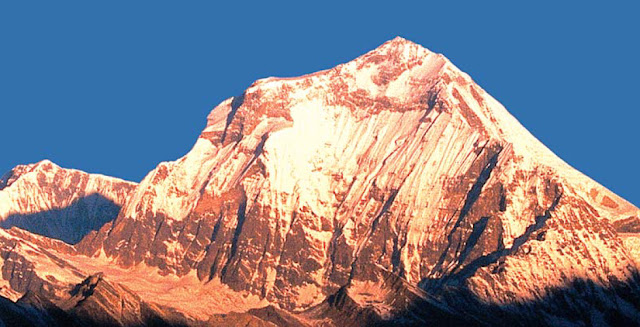The Dhaulagiri
massif lies northwest of Pokhara and climbing this mountain was at first considered
impossible. It looked formidable and the French expedition that came to Nepal in 1950 and successfully climbed Annapurna I, didn’t even give this peak a second thought.
Captain William ebb who came in 1809 was the first European to set eyes on Mt. Dhaulagiri.
When he calibrated the height of the mountain, he was amazed. Up until then,
the Andes in South America were considered the
highest chain of mountains in the world. The news of this new discovery left
the rest of the world incredulous. For many years since the revelation, Dhaulagiri was thought to be the highest mountain in the
world.
“The White Mountain”
as it was known to foreigners, was one of the peaks that could not be conquered
during the Golden Decade. Although numerous attempts were made throughout the
1950s, none were successful. A string of expeditions arrived in Nepal:
the Argentinians tried their luck in 1954. A Swiss- German team gave it a shot
in 1955, and were followed by the Argentinians making a bid in 1956 once again,
but with no better luck. In 1958, the Swiss were back and returned yet again
without reaching the summit. Then it was the turn of the Austrians who could go
no further than 7,802m.
In 1960, another Swiss expedition arrived in
Nepal led by Max Eiselin and the team included Kurt Diemberger and Norman Dyhrenfurth
who went on to earn a name for themselves. They brought along a Pilatus Porter
named ‘Yeti’ which was piloted by Ernst Saxer for making drops on the French Pass
up in the mountain. The expedition met with countless problems and was
compounded by the crash of the Yeti. The pilot and repairman luckily escaped unhurt
and walked all the way back to Pokhara from the mountain. But the expedition
persevered and 13th May 1960 proved to be a lucky day for the mountaineers as
it was a bright sunny day with practically no wind blowing. Six members of the expedition
reached the summit to become the first to climb Dhaulagiri.
They were Kurt Diemberger, Nawang Dorjee Sherpa, Ernst Forrer, Albin Schelbert,
Peter Diener and Nima Dorjee Sherpa. Ten days later, Jugo Weber and Michel
Vaucher followed in their footsteps and made it to the top. Nawang Dorjee
became the first Nepali to climb the peak.
The numbers were amazing on this climb, 13
members set off to climb the mountain, summitted on the 13th and it happened to
be the 13 eight-thousander to be climbed. No bad luck there.

No comments:
Post a Comment